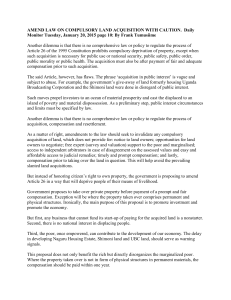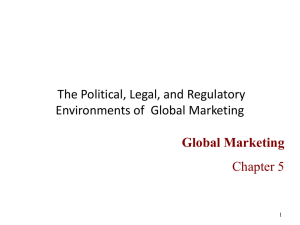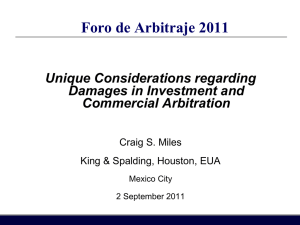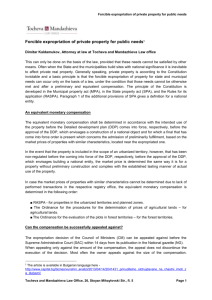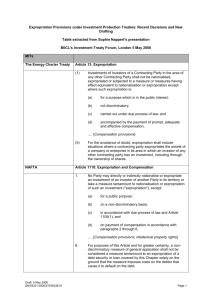Agri SA comments on Exropriation Bill of 2015
advertisement
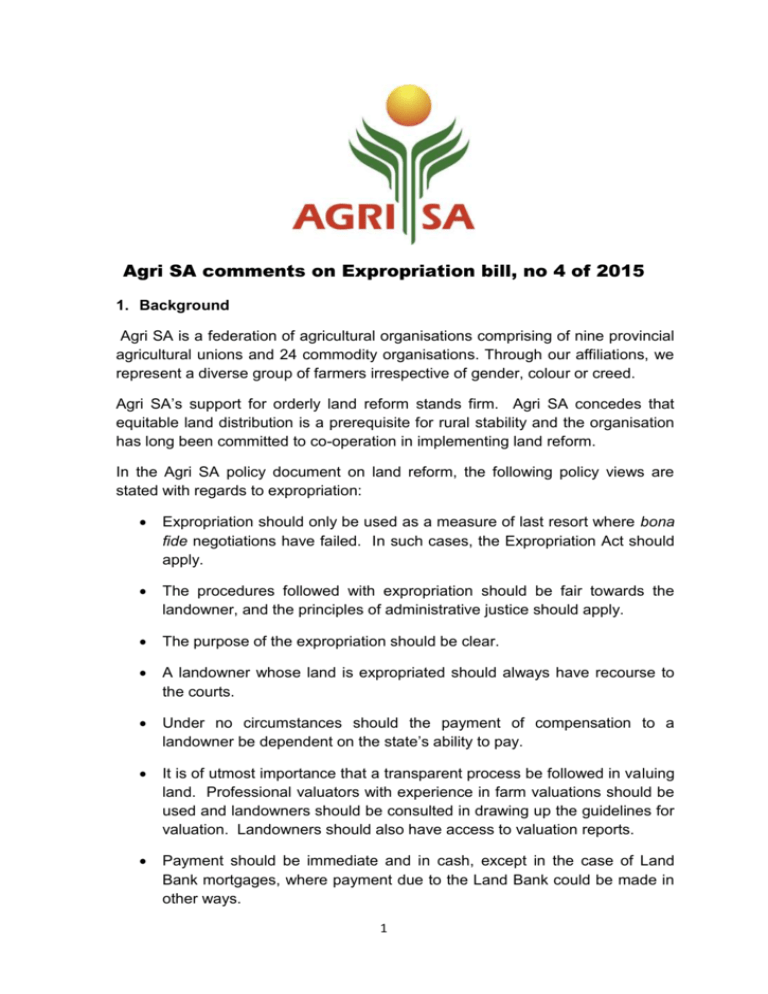
Agri SA comments on Expropriation bill, no 4 of 2015 1. Background Agri SA is a federation of agricultural organisations comprising of nine provincial agricultural unions and 24 commodity organisations. Through our affiliations, we represent a diverse group of farmers irrespective of gender, colour or creed. Agri SA’s support for orderly land reform stands firm. Agri SA concedes that equitable land distribution is a prerequisite for rural stability and the organisation has long been committed to co-operation in implementing land reform. In the Agri SA policy document on land reform, the following policy views are stated with regards to expropriation: Expropriation should only be used as a measure of last resort where bona fide negotiations have failed. In such cases, the Expropriation Act should apply. The procedures followed with expropriation should be fair towards the landowner, and the principles of administrative justice should apply. The purpose of the expropriation should be clear. A landowner whose land is expropriated should always have recourse to the courts. Under no circumstances should the payment of compensation to a landowner be dependent on the state’s ability to pay. It is of utmost importance that a transparent process be followed in valuing land. Professional valuators with experience in farm valuations should be used and landowners should be consulted in drawing up the guidelines for valuation. Landowners should also have access to valuation reports. Payment should be immediate and in cash, except in the case of Land Bank mortgages, where payment due to the Land Bank could be made in other ways. 1 Agri SA was one of the organisations that opposed the 2008 Expropriation Bill on the basis that we believed that it limited access to the courts and was not in line with sections 25, 33 and 165 of the Constitution. This has been rectified in the current Bill. After the withdrawal of the previous Bill from the parliamentary process the Department of Public Works (DPW) embarked on a long process to redraft the Bill and they ought to be commended on the inclusive and extensive process of consultations and their robust engagement with stakeholders in NEDLAC. Agri SA commented on the draft bill and also participated, as part of the Business delegation in the NEDLAC process. We found DPW to be open to criticism and comments and willing to truly engage all stakeholders. As a result, the Bill before Parliament has been improved through the public comment process as well as the NEDLAC process and, from our point of view, there remain only a few areas of concern. Expropriation or compulsory acquisition as it is often referred to in international literature is a tool which is widely used internationally and this has been the case for many decades. As such, international best practice models have emerged over time. A recent study by the United Nations Food and Agricultural Organisation (FAO) reflected on international best practice regarding the compulsory acquisition of land and compensation. The publication can be viewed at: ftp://ftp.fao.org/docrep/fao/011/i0506e/i0506e00.pdf. The report states amongst other things: “Countries retain powers of compulsory acquisition in order to enable governments to acquire land for specific purposes. The nature of these powers and the ways in which they are used are invariably sensitive and have wide implications, including from the perspective of international agreements on human rights and their national expressions. Compulsory acquisition is disruptive for those who are affected and whose land is taken and, if done poorly, will have serious negative impacts on people and their livelihoods. It is important, therefore, that satisfactory approaches are in place and effectively implemented to ensure that communities and people are placed in at least equivalent positions to those before the land acquisition. Prerequisites for this are appropriate legal frameworks and capacities for implementation, and good governance and adherence to the rule of law.” The report then proposes a number of principles for legislation on compulsory acquisition, which Agri SA fully supports: “Principles for legislation on compulsory acquisition should include: • Protection of due process and fair procedure. Rules that place reasonable constraints on the power of the government to compulsorily acquire land strengthen the confidence of people in the justice system, empower people to protect their land rights, and increase the perception of tenure security. Rules should provide for appropriate advance consultation, participatory planning 2 and accessible mechanisms for appeals, and should limit the discretion of officials. • Good governance. Agencies that compulsorily acquire land should be accountable for the good faith implementation of the legislation. Laws that are not observed by local officials undermine the legitimacy of compulsory acquisition. Good governance reduces the abuse of power and opportunities for corruption. • Equivalent compensation. Claimants should be paid compensation which is no more or no less than the loss resulting from the compulsory acquisition of their land. Laws should ensure that affected owners and occupants receive equivalent compensation, whether in money or alternative land. Regulations should set out clear and consistent valuation bases for achieving this. Our members are heavily invested in land, and expropriation will always be an unpleasant process, which nobody is keen on, so they are understandably concerned about the possibility of expropriation. Nevertheless, we realize that expropriation is a necessary tool in all societies. 2. Specific comments 2.1 Definitions The definition of “expropriating authority” has been formulated in very wide terms. It is defined as “an organ of state or a person empowered by this Act or any other legislation to acquire property through expropriation”. In terms of section 239 of the Constitution, any functionary or institution which exercises a power or performs a function in terms of the Constitution or a provincial Constitution or exercises a public power or performs a public function in terms of any legislation is included in the definition of “organ of State”. We believe that this definition should be narrowed down. The definition of “public interest”: We submit that this definition is too broad and leaves room for uncertainty as to the expropriating authority’s interpretation of matters falling within the public interest. Section 25(1) of the Constitution after all stipulates that no law may permit arbitrary deprivation of property. We submit that it is therefore necessary to move the discretionary determination as to what constitutes expropriation “in the public interest” from the executive authorities to the legislative authorities (either through a circumscribed definition of “public interest” or through ministerial guidelines) in order for government to exercise its powers in terms of clear rules and principles in a non-arbitrary fashion. 3 2.2 Clause 11: Consequences of expropriation of unregistered rights and duties of expropriating authority Subclause 5 states as follows: “(5) If the expropriated owner or expropriated holder knew of the existence of an unregistered right contemplated in subsection (2) and failed to inform the expropriating authority of the existence thereof, the expropriated owner or expropriated holder, as the case may be, is liable to the expropriating authority for any loss incurred in the event of the expropriating authority having to pay compensation for the expropriation of the unregistered right after the date of payment of compensation to the expropriated owner or expropriated holder, as the case may be.” The definition of an unregistered right is very wide and quite vague. It may very well be that a landowner was aware of people utilising the land for gathering firewood or access to graves, but did not know that these are compensable rights. This provision seems to be placing an unacceptable burden on owners to know exactly who is exercising what rights on their farms (keeping in mind that some farms are very large) and knowing which of these rights qualify for compensation upon expropriation. 2.3 Clause 12: Compensation for expropriation The role of market value in the determination of compensation for expropriation has long been a point pondered by academics [see Andra Eisenberg ‘Different constitutional formulations of compensation clauses' (1993) 9 SAJHR 412; Aninka Claassens ‘Compensation for expropriation: The political and economic parameters of market value compensation' (1993) 9 SAJHR 422; Duard Kleyn ‘The constitutional protection of property: A comparison between the German and the South African approach' (1996) 11 SA Public Law 402 at 441—5; A J van der Walt, ‘The Constitutional Property Clause: A Comparative Analysis of Section 25 of the South African Constitution of 1996’ (1997) 141—8; Geoff Budlender ‘The constitutional protection of property rights' in Geoff Budlender, Johan Latsky & Theunis Roux (eds) Juta's New Land Law (Original Service 1998) at 1—56—67; Jill Zimmerman ‘Property on the line: Is an expropriation-centered land reform constitutionally permissible?' (2005) 122 SALJ 378; and AJ Van Der Walt, ‘Reconciling the states duties to promote land reform and to pay ‘just and equitable' compensation for expropriation’ 2006 SALJ 23]. 4 The general consensus between these authors is that, in order to promote and facilitate effective land reform expropriation, it is necessary to weaken the grip of the market value principle for compensation, but that all the relevant circumstances (including the ones mentioned in section 25(3)(a)-(e) of the Constitution, but not restricted to them) should be considered together in deciding what would be just and equitable compensation [see AJ Van Der Walt, ‘Reconciling the states duties to promote land reform and to pay ‘just and equitable' compensation for expropriation’ 2006 SALJ at 26]. In practice, market value still plays a useful role because of the determinacy and quantification difficulty in establishing appropriate consideration. This is especially clear from the practice to first establish market value, as an initial indicator of value, and then determine whether it should be adjusted in view of the other less quantifiable factors in section 25(3) of the Constitution to be more just and equitable [see the court decisions in Khumalo v Potgieter [2000] 2 All SA 456 (LCC); Du Toit v Minister of Transport 2003 (1) SA 586 (C) paras 23—52]. In Du Toit v Minister of Transport 2006 (1) SA 297 (CC) para 35 the majority of the Constitutional Court followed a comparable approach in deciding whether a particular compensation award was constitutionally justifiable: first establish what compensation would be according to the ‘standard' approach and then check whether it is in line with the other constitutional demands. Market value should of course not be favoured at the expense of the other considerations enumerated in section 25(3) of the Constitution, but we are of the opinion that it remains an acceptable starting point. Agri SA accepts that section 25 of the Constitution is the basis for the calculation of compensation and that the norm is “just and equitable compensation”. We do however subscribe also to the principle of “equivalence” as set out in the FAO report on compulsory acquisition and compensation. This principle entails: “Compensation, whether in financial form or as replacement land or structures, is at the heart of compulsory acquisition. As a direct result of government action, people lose their homes, their land, and at times their means of livelihood. Compensation is to repay them for these losses, and should be based on principles of equity and equivalence. The principle of equivalence is crucial to determining compensation: affected owners and occupants should be neither enriched nor impoverished as a result of the compulsory acquisition. Financial compensation on the basis of equivalence of only the loss of land rarely achieves the aim of putting those affected in the same position as they were before the acquisition; 5 the money paid cannot fully replace what is lost. In some countries, there is legal provision recognising this in the form of additional compensation to reflect the compulsory nature of the acquisition. In practice, given that the aim of the acquisition is to support development, there are strong arguments for compensation to improve the position of those affected wherever possible.” Agri SA’s view is that land reform is a national priority that should be funded with general taxpayer money. Individuals cannot be expected to bear this cost. Landowners, whose land is earmarked for land reform purposes, must be placed in a position to continue farming elsewhere in a similar manner, should they wish to do so. It should be clear that compensation paid to holders of unregistered rights is over and above any compensation paid to the owner and is not to be subtracted from compensation due to the owner. Clause 12.2 states that the fact that the property has been taken without the consent of the expropriated owner or expropriated holder, must not be taken into consideration by the expropriating authority. . Expropriation without consent is a traumatic experience often causing financial loss, emotional trauma and suffering and a property owner should be compensated for this. The concept of a “solatium” as it appears in the Expropriation Act should therefore be retained and actual financial loss resulting from the expropriation should also be compensated for. The particular sub clause (12(2)(a) should be deleted. 2.4 Clause 18: Property subject to mortgage bond or deed of sale Agri SA supports the wording of clauses 18(1) and (2) as it gives some protection to landowners, who have very little bargaining power vis-a-is financial institutions holding bonds over property. Whilst Agri SA recognizes the critical importance of investment in the sector, we cannot support a scenario where the landowner alone carries all the risk of possible lower than market value compensation and ends up walking away with nothing if the bond is more than the compensation received for the property. This is one of the reasons why marketrelated compensation is so important to our members and our sector, which is very dependent on production credit. If financial institutions were to consider farms too great a risk, there are very real implications for food security. At the same time, individual landowners cannot be expected to foot the bill for land reform through reduced non-market related compensation. A balance needs to be struck somehow. 6 Conclusion Experience in other countries has shown that expropriation does not speed up land reform significantly, nor does it make land reform more affordable. In fact the contrary seems to be true. Expropriation does have a limited role to play in land reform as a measure of last resort. When expropriation is utilised it should be perceived by all to be a fair and transparent process. Current landowners should receive compensation, which will enable them to start anew somewhere else; they should not be worse-off as a result of the expropriation. The full cost of expropriation should be borne by the fiscus, individual landowners cannot be expected to foot the bill for land reform through reduced non-market related compensation. In the interest of the future of this country government should nurture the agricultural sector. Agri SA hereby also requests an opportunity to address the Portfolio Committee on Public Works on this submission. 7

